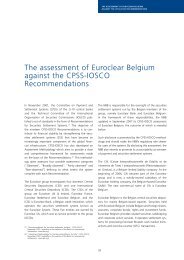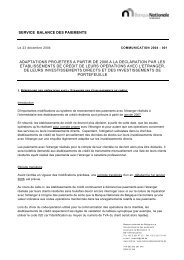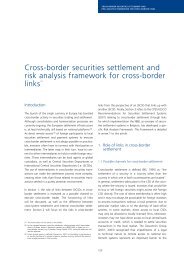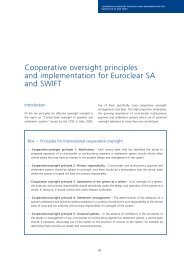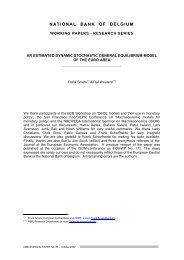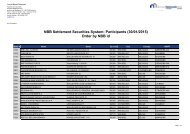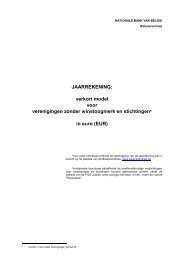Economic importance of the Flemish maritime ports: Report 2002
Economic importance of the Flemish maritime ports: Report 2002
Economic importance of the Flemish maritime ports: Report 2002
You also want an ePaper? Increase the reach of your titles
YUMPU automatically turns print PDFs into web optimized ePapers that Google loves.
PrefaceFor several years <strong>the</strong> National Bank <strong>of</strong> Belgium has published annual studies relating to <strong>the</strong> <strong>ports</strong> <strong>of</strong> Antwerp,Ghent, Ostend and Zeebrugge. These four studies will from now on be presented as a single item. In addition tothis change <strong>of</strong> form, <strong>the</strong> methodology has been considerably changed, notably for <strong>the</strong> purpose <strong>of</strong> estimating <strong>the</strong>indirect effects linked to <strong>the</strong> activity <strong>of</strong> <strong>the</strong> port sector. This approach <strong>of</strong>fers <strong>the</strong> best way <strong>of</strong> assessing <strong>the</strong>ireconomic <strong>importance</strong>.Introduction and objectives <strong>of</strong> <strong>the</strong> reportRestructuring <strong>of</strong> <strong>the</strong> <strong>ports</strong> went on throughout <strong>the</strong> nineties following changes in <strong>the</strong> economic environment:dispersal <strong>of</strong> centres <strong>of</strong> rapidly expanding foreign trade, accelerated internationalisation <strong>of</strong> production andconsumption processes and new requirements for world trade in terms <strong>of</strong> transport and distribution. The portauthorities now had to adopt new management styles to bring <strong>the</strong> <strong>ports</strong> more in line with <strong>the</strong> market. Rapidchanges were seen, particularly in <strong>the</strong> container sector in <strong>the</strong> Hamburg – Le Havre range 1 , in order to make <strong>the</strong><strong>ports</strong> in this region more attractive to this trade. The need for automation was also undeniable and <strong>the</strong> cargohandlers recorded significant job losses due to takeovers and mergers in this sector.« Cargo handling is [indeed] one <strong>of</strong> <strong>the</strong> activities most affected by technological progress and competitionbetween <strong>ports</strong>. The market trend is towards concentration <strong>of</strong> capital, specialisation and vertical integration.Provision <strong>of</strong> <strong>the</strong>se services is being transferred, little by little, from <strong>the</strong> public to <strong>the</strong> private sector in order toincrease efficiency and reduce public expenditure on labour at <strong>ports</strong>. » 2 This phase <strong>of</strong> liberalisation <strong>of</strong> <strong>the</strong> portcargo handling sector (dockers) across Europe was a result <strong>of</strong> <strong>the</strong> order made by <strong>the</strong> Court <strong>of</strong> Justice <strong>of</strong> <strong>the</strong>European Communities on 10 December 1991 (also called <strong>the</strong> « Port <strong>of</strong> Genoa » order). 3Ports in Europe are <strong>of</strong> considerable <strong>importance</strong> in terms <strong>of</strong> labour. They have considerable infrastructurerequirements and are at <strong>the</strong> heart <strong>of</strong> a huge network <strong>of</strong> interdependent branches <strong>of</strong> activity. Their growth is veryimportant for <strong>the</strong> European economy.In addition, « (...) because <strong>of</strong> its geography, its history and, now, globalisation, <strong>the</strong> European Union (EU) remainsheavily dependent on <strong>maritime</strong> transport:• More than 90 p.c. <strong>of</strong> its foreign trade and around 43 p.c. <strong>of</strong> its domestic trade is done by sea; in totalmore than 1 billion tonnes <strong>of</strong> freight are unloaded and loaded in <strong>ports</strong> in <strong>the</strong> Union each year; 4• The shipping companies belonging to EU countries control a third <strong>of</strong> <strong>the</strong> world fleet and around 40 p.c. <strong>of</strong>EU trade is carried on ships controlled by European shipping companies (which doesn't mean that <strong>the</strong>irships are flying <strong>the</strong> flag <strong>of</strong> an EU member);• The <strong>maritime</strong> transport sector, which also includes shipbuilding, <strong>the</strong> <strong>ports</strong>, fishing and related industriesand services, employs some 2.5 million people in <strong>the</strong> European Union. » 5Just as in <strong>the</strong> air, road and inland water transport sectors, <strong>the</strong> process <strong>of</strong> liberalization and opening up <strong>maritime</strong>transport to competition from national markets within <strong>the</strong> Union is practically complete. (...)This necessary process has not, unfortunately, been sufficient to stop <strong>the</strong> continuing exodus <strong>of</strong> <strong>the</strong> communityfleet to what are called « flags <strong>of</strong> convenience », i.e. countries <strong>of</strong>fering shipping companies much more favourable12345This term refers to <strong>the</strong> area where different important sea<strong>ports</strong>, serving <strong>the</strong> same hinterland, operate and <strong>the</strong>refore are incompetition with each o<strong>the</strong>r.Quotation from <strong>the</strong> EC Green Paper relating to « Maritime <strong>ports</strong> and infrastructures » published on 10 December 1997.See <strong>the</strong> speech by K. Van Miert made at Ghent on 6 October 1997: « Competition rules and <strong>maritime</strong> <strong>ports</strong> », or see <strong>the</strong>website <strong>of</strong> <strong>the</strong> Court <strong>of</strong> Justice <strong>of</strong> <strong>the</strong> European Communities.The increase <strong>of</strong> <strong>the</strong> port infrastructure is mainly due to <strong>the</strong> growth <strong>of</strong> <strong>the</strong> container transport. The latter considerably reduces<strong>the</strong> cost <strong>of</strong> shipping (for example compared to bulk cargo). The main factor which determines such a low cost level lies in<strong>the</strong> rapidity and flexibility <strong>of</strong> this mode <strong>of</strong> transport and <strong>the</strong> economies <strong>of</strong> scale it allows (some ships can carry up to10,000 TEU – see glossary in annex 9). Maritime transport is also economically essential for distances greater than 1,500kilometres. This explains its <strong>importance</strong> for extra-Community trade (Sources: work by Dr. Jean-Paul Rodrigue <strong>of</strong> <strong>the</strong> Dept.<strong>of</strong> <strong>Economic</strong>s & Geography, H<strong>of</strong>stra University, 11549 NY - USA; « Maritime <strong>Economic</strong>s » 2nd edition, Martin Stopford).Extracts from <strong>the</strong> « Overall view <strong>of</strong> <strong>the</strong> <strong>maritime</strong> transport policy » supplied by <strong>the</strong> European Commission. For fur<strong>the</strong>rinformation, see <strong>the</strong> website http://europa.eu.int/comm/transport/<strong>maritime</strong>.NBB WORKING PAPER No. 56 - JUNE 2004 1



